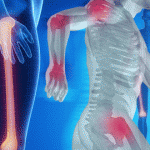(Reuters Health)—Middle-aged women who get poor quality sleep have elevated levels of inflammatory markers, suggesting their risk for heart disease and other illnesses may be increased, U.S. researchers say. Based on sleep monitoring and blood tests of 295 women, most of whom were past menopause, researchers found those who had trouble falling asleep or who…
Novel Bone Drug Promising in Postmenopausal Osteoporosis
NEW YORK (Reuters Health)—The investigational drug romosozumab led to gains in hip bone mineral density (BMD) that were not seen with teriparatide in older women with osteoporosis transitioning from bisphosphonate therapy in the STRUCTURE study. Amgen’s romosozumab is a monoclonal antibody that inhibits sclerosin, a negative regulator of bone formation. In addition to stimulating bone…

U.S. & Europe Evaluate Abaloparatide Injection & Europe Approves Marketing Baricitinib for RA
Injectable abaloparatide is being evaluated in the U.S. and Europe to treat postmenopausal women with osteoporosis…

The Gut Microbiome Influences Postmenopausal Bone Loss
Bone health has been successfully improved by using probiotics to influence the gut microbiome in postmenopausal women with osteoporosis. New research has gained insight into this process, uncovering that sex steroid depletion increases gut permeability resulting in inflammation and pathology in mice. Treatment with probiotics also prevents this increase in gut permeability and bone loss associated with sex steroid depletion…

Comment Period Open for FDA Draft Guidance on Osteoporosis Treatments; Plus FDA Rejects Abuse-Deterrent Apadaz
The FDA is currently accepting comments on a draft guideline for osteoporosis treatments, which calls for more research into the long-term effects of drugs on bone quality. Also, the FDA has rejected an application for approval of Apadaz in its current form…
Abaloparatide May Boost BMD in Older Women with Osteoporosis
NEW YORK (Reuters Health)—The investigational drug abaloparatide may help postmenopausal women increase their bone mineral density (BMD) and reduce their risk of fracture, new industry research suggests. “What was surprising and very important about this study was that, although some drugs for osteoporosis don’t work across all patient subgroups, abaloparatide provided persistent protection against fracture…
Combination Therapy Bests Monotherapy in Severe Postmenopausal Osteoporosis
NEW YORK (Reuters Health)—The combination of denosumab and teriparatide improves bone microarchitecture and estimated strength more than either drug alone in women with severe postmenopausal osteoporosis, researchers have found. Dr. Joy Tsai, from Massachusetts General Hospital in Boston, and colleagues conducted a single-site, two-year, open-label, randomized controlled trial involving 94 women aged 45 or older…

Do Bisphosphonates Increase Risk of Carpal Tunnel Syndrome?
In a large-scale study, researchers demonstrated that the use of bisphosphonates in postmenopausal women is associated with an increased risk of carpal tunnel syndrome, in addition to other known risks (e.g., incapacitating bone, joint and/or musculoskeletal pain, and osteonecrosis of the jaw)…
Denosumab Does Not Stimulate Early Bone Formation
NEW YORK (Reuters Health)—The early elevation in intact parathyroid hormone (iPTH) seen with denosumab treatment is not associated with increased bone formation, according to research from Eli Lilly and Company. Denosumab is a member of the anticatabolic/antiresorptive class of drugs used to treat osteoporosis; iPTH levels are increased in the first several months after denosumab…
Amgen, UCB Say Osteoporosis Drug Meets Main Goal in Late-Stage Trial
(Reuters)—Amgen Inc. and Belgium-based UCB SA said on Monday that their osteoporosis drug met all the primary endpoints by reducing the incidence of new vertebral fracture in postmenopausal women with osteoporosis in a late-stage study. The topline results, from a Fracture study in postmenopausal women with osteoporosis (FRAME), showed that the drug romosozumab met a…